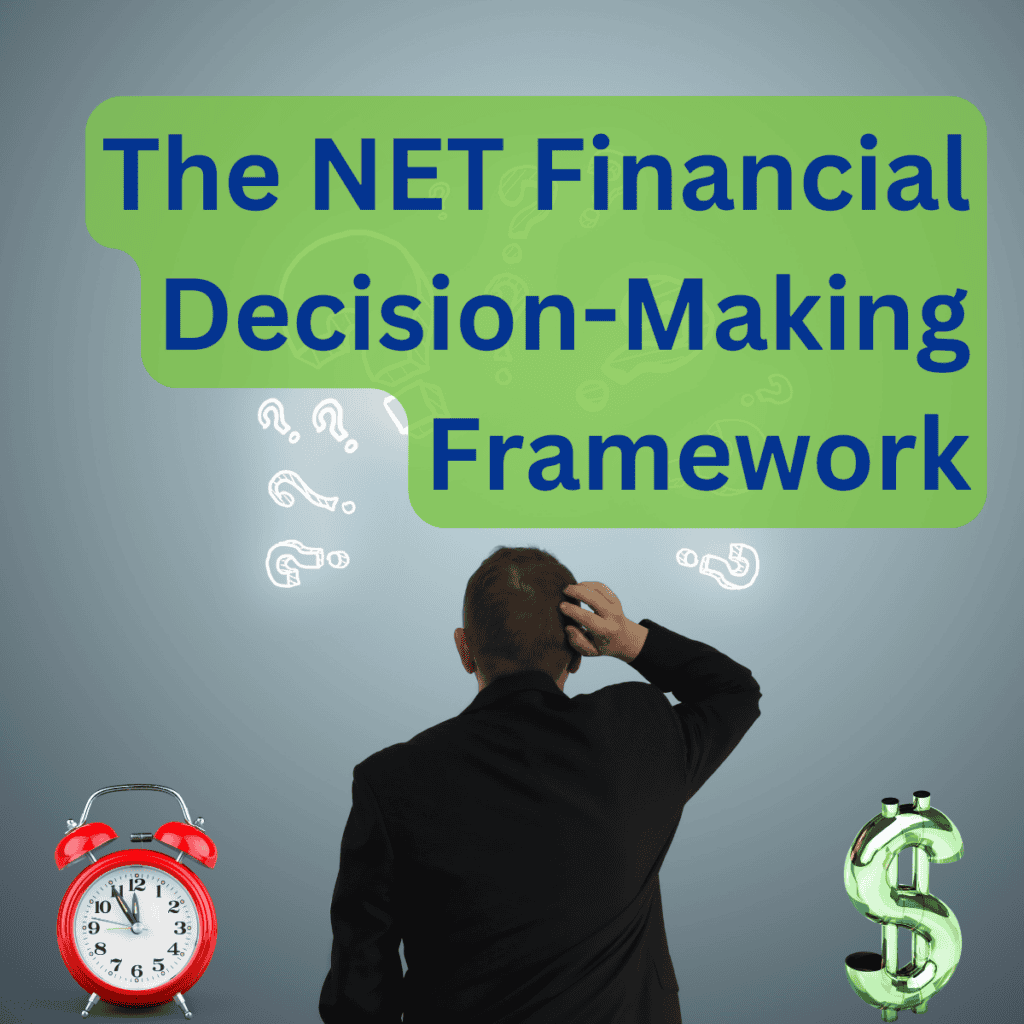
How do we avoid regretting our financial decisions? Making better decisions is the obvious answer, but how do we do that? If you’ve ever felt a little tingle of regret, I think I can help.
At the end of the day, we eventually have to make a decision and move on. In the military, indecisiveness is frowned upon, deadly even. Take charge! Make a decision! But we usually don’t take the time to really analyze things and think about how to make better decisions.
Let me walk you through my NET financial decision-making framework.
Getting Everything on the Table
I like to say that you need to lay everything out on the table and then sort through it. I envision this as taking all the financial bits (numbers, facts, and figures), laying those down next to all the emotions (uncertainty, fear, anxiety, joy), and reconciling the two.
However, this isn’t always an easy process. Some decisions take us through multiple twists, turns, and conversations for weeks or even months. I believe there are three key ingredients to good financial decision-making: Numbers, Emotions, and Time.
Getting the Numbers on the Table
This is where I get really excited! I get to make a spreadsheet! My wife couldn’t care less about all the calculations I put together in my spreadsheets, but having the numbers helps bring us into reality and explore possibilities.
Total Cost of the Decision
I like to calculate the total potential cost of whatever decision we’re trying to make, the “money at stake,” and then go from there. To do this, I’ll look at the best-case scenario and worst-case scenario. Then, you have the two ends of your “sliding scale” for your decision. Along that scale of possibilities, you can then decide what’s an acceptable outcome in either direction.
In other words, you want to run the numbers with the least generous assumptions and then with the most generous assumptions. Both must be based on facts. This is not a dreaming session. The difference between where you are now and the estimated outcome is your total cost of the decision.
Identifying Financial Levers
The most critical part of this exercise is figuring out what you can actually control. These are the levers you can pull to adjust things. For instance, if you’re in the military, you can’t always do much to make more money short of a promotion. Once you reach a certain point, promotions are a guessing game at best. Side hustles aren’t always practical, and your spouse may or may not be able to work.
On the other hand, you can control things like how much you spend on entertainment, what kind of truck you drive, and where you live near base. Many people turn to smaller everyday expenses first. This can help over the long run, but big-ticket items like driving a cheaper car, skipping a big vacation this year, or living in an apartment versus a single-family home can move the needle much more than just skipping the occasional coffee.
However, many of these big decisions you control are often tied to you emotionally. Once you start talking things through, you may uncover or notice a lot of fear or anxiety around money. This is where the emotions come into play.
Getting the Emotions Out
Depending on your personality, this can be quick and painless or long and arduous. As much as I play the part of a stoic leader at work, I’m an emotional person elsewhere. I talk a lot, sing, journal, write blogs and newsletters, and discuss with friends and family members.
My wife is the opposite. She’s got many different emotions, but she quietly processes things. I often take her on a wild rollercoaster of emotions as I share all the different ways I’m pushed and pulled through a decision. She does all that silently, then hits me with her patented “I’ve decided…” routine.
I’m the outside of the tornado spinning around and flinging ideas and emotions everywhere. My wife is the eye of the storm, it feels calm, but you can see and feel the storm just on the horizon.
Asking Questions to Uncover Emotions
The best way I’ve found to get the emotions out of both of us is to clearly define what and when we’re trying to decide. Then, I ask open-ended questions and shut up (at least as much as I can). Here are some of my favorite question formats for this:
- What do you think about ___?
- How do you feel about ____?
- If money wasn’t an issue, what would you want to do with __?
- What am I missing regarding ____?
- How big of a deal would it be if ____?
- If we could __, how would that affect __?
- What does having ___ mean to you?
- How does ___ affect you?
- If we had the money, what kind of ____ would you want?
These are simple versions of what I actually say, but you get the point. I like to play a game to see how much information I can get before offering my opinion. I suck at this game because I love my own opinions. However, I still practice turning off my voice and listening as much as I can.
Using a Therapist or Counselor to Help
Don’t be afraid to enlist the help of a counselor or therapist. My wife and I have used free counseling through Military OneSource several times. The last time, it was to work through some emotions around money. Fascinating enough, as we did better financially, we had more emotional issues with money not less.
The fear and anxiety of losing wealth or perceived status are a real concern as we improve our finances. Most of these aren’t real threats; we can logically see we’re better off than ever. However, when we look back, we also don’t want to go back to where we came from.
Bottom line, you also need to understand the emotions tied to each of your financial levers.
Give Yourself Time
Time is the most critical yet overlooked component to making good decisions – financial or otherwise. When do you actually need to make this decision?
If you can give yourself more time, do it. Even if you can only delay for an hour or two, you’ll get a better outcome. There’s a reason why car dealerships won’t let you leave the lot without agreeing to something. They know that their chances of a sale go down the longer you think about it.
Ideas for Gaining More Time
You can flip this in your favor by making sure you give yourself time to decide. I’ve seen far too many “emergencies” trick people into making bad financial decisions. Examples of giving yourself time:
- Bum a ride for a week or more if your car is broken down.
- Staying in the hotel for an extra bit during a PCS to find an affordable place that meets your needs.
- Waiting for that new gadget to be on sale (or skipping it completely).
- Create a “sleep on it” rule before buying anything over $__
- Turn off One-Click ordering on Amazon (I actually gave up access to my Amazon account completely!)
The Value of Making Good Financial Decisions
I can’t overstate the value of making good decisions. You’ll end up with less regret and more money if you make better decisions. We can’t ever know the exact right answer, but we can make the best decision given current information and assumptions. We can call these “best guesses” if you want.
In almost all my worst financial decisions, I was pressed for time or trying to “fix” an emotional problem. A great example of this was the truck that started our financial awakening of sorts. We needed to scale down to one vehicle to move to Germany, but I wasn’t willing to give up having a truck.
If I’m honest with myself, that was all about maintaining the image of being “a truck guy” or persona of power. That decision cost us quite a bit at the time and set us back financially for quite some time.
Decisions Compound Over Time
I’ll leave you with this: Decisions compound over time. Good, bad, or ugly, decisions can have a ripple or butterfly effect on your future financial life. Compound interest doesn’t discriminate, and it can work for you or against you. This is why taking the time to be intentional about your decisions around money is critical.
It’s okay to make emotional decisions, but you need to understand and accept the financial costs. Some things in life can’t be quantified like the joy of having a child or spending that summer traveling before you had kids.
Money is meant to be spent and life is meant to be lived. The key is to use one to enhance the other. Choose wisely.
